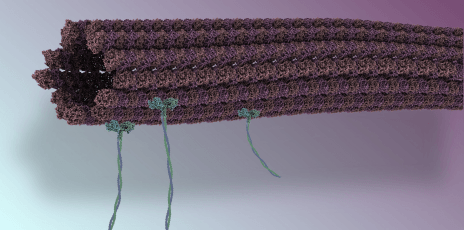Artificial Nanoscale Factories Produce Biological Molecules

Researchers at ETH Zurich and IBM are reporting success in creating a nano biological assembly line, borrowing ideas from large factories.
This is first time that researchers have had success in creating a nano assembly line that would enable assembly of new complex molecules. Researchers have long theorized the usefulness of such a system that would enable a bottom up approach to creating complex molecules in the lab. The production line is three times thinner than human hair and has all the features of a conventional assembly line. Elements include a mobile assembly carries to bring raw materials to the line, an assembly object and assembly objects such as stations, motor, etc.
Building Nano Factories
At nano-scale it is essentially a microfluid canal system, with inflow and outflow at right angles. The canal system is lined with motor protein kinesin which has dual ATP activated mobile heads. Microtubules attached to the kinesin serve as assembly carriers along with the liquid flowing through the canal. The canal is divided into loading area and two assembly and to end stations. The end stations are where the end product is delivered.
Bright Future for Nano Factory Lines
The project was done in partnership with IBM’s Nanotech Research Center in Ruschlikon. A lot of effort went into designing the canals and separating kinesin without the loss of any functionality. In the test, researchers involved were able to attach a short strand of DNA to NeutrAvidin. The nano scale factory is currently just a proof of concept, with technical applications no where in sight. However, its potential uses include producing and selective modification of proteins, DNA, organic polymers or nanotechnological components.
Ref: DOI: 10.1039/C4LC00385C
Source: Nanoscale Assembly Line

